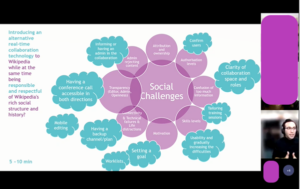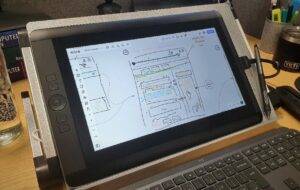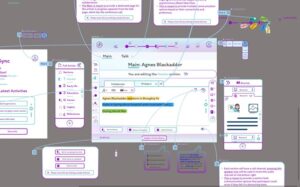Co-designing a collaborative training tool to support real-time collaborative writing
Introducing Dr Abd Alsattar Ardati’s novel Ethnographically-informed Distributed Participatory Design Framework for Sociotechnical Change, a pioneering outcome of his PhD research! This unique approach offers a fusion of ethnographic methodologies and participatory design principles, promising to enhance our understanding of sociotechnical systems while empowering researchers to get closer to communities and drive meaningful change.
Join us on a journey of innovation and collaboration as we explore the limitless potential of HCI research in shaping tomorrow’s digital landscape!
Overview
While Wikipedia’s success hinges on asynchronous collaboration, Dr Ardati’s research illuminates how bureaucratic rules and technical infrastructure may inadvertently perpetuate content bias. Through an innovative Participatory Design process, WikiSync emerged as a beacon of change, introducing real-time collaboration while honouring Wikipedia’s rich social fabric. Additionally, an adaptive co-design methodology, shaped by online ethnography, offers a roadmap for navigating distributed communities’ complexities, laying the groundwork for broader sociotechnical innovation.
Methods
Using observational studies and participatory design methodologies, this research tackles Wikipedia’s sociotechnical challenges head-on. Leveraging ethnography for contextual insights, the Hagen et al. (2012) framework guides the development of a tailored participatory design approach. Synchronous methods enable deep deliberation, while asynchronous techniques engage diverse voices, fostering inclusivity in defining future visions and evaluating design alternatives. By flexibly adapting to community needs, this methodology champions collaboration and community-driven innovation.
Results
WikiSync emerges as a promising solution, introducing real-time collaboration while upholding Wikipedia’s ethos. Through iterative co-design and community consultation, WikiSync addresses concerns and preferences, providing transparency and flexibility in training design. The resulting Ethnographically-informed Distributed Participatory Design (EDPD) framework lays the groundwork for systemic change in online communities, identifying key challenges and opportunities for improvement.
Impact
Dr. Ardati’s research transcends academia, making waves in societal and industry spheres through responsible innovation. Acknowledged by esteemed institutions like the Wikimedia Foundation, his work has earned him a scholarship to attend Wikimania 2024 conference taking place in Poland. At this event, Dr. Ardati will share his findings through engaging presentations and interactive sessions, igniting conversations around the future of collaborative technology in online communities.
Additionally, Dr Ardati is currently supervising one of our MSc students, delving into the findings from the PhD research to further explore their implications and applications within organisations like Wiki Education. This partnership not only fosters community engagement but also establishes digital research pathways for future HCI enthusiasts to engage with open knowledge projects and organisations.
Dr. Ardati’s impact extends beyond the confines of the HCI domain, resonating across diverse fields of academia. His recent talk at the Eighth Annual UK System Research Challenges Workshop exemplifies his dedication to advancing collaborative technology and fostering inclusive innovation practices. As his insights continue to inspire and inform, Dr Ardati remains at the forefront of driving positive change in collaborative technology and beyond, connecting one of our HCI MSc students to explore practical applications under his supervision.
Discussion
The findings of this research have important implications for both the field of collaborative technology design and the broader online community dynamics. By successfully introducing real-time collaboration to Wikipedia’s training environment through WikiSync, this project demonstrates the feasibility of enhancing existing collaborative models while respecting community norms and values. On the other hand, the EDPD framework offers a systematic approach that can be applied to other online communities facing similar challenges, such as bias in content creation and newcomer retention.
Moreover, this research underscores the importance of inclusive innovation processes in addressing complex sociotechnical issues. By engaging diverse community members in the co-design process, WikiSync was able to address concerns and preferences, leading to a more effective and sustainable solution. This highlights the potential for participatory design methodologies to drive meaningful change in online platforms.
Future
Future directions for this research could involve further refinement and evaluation of WikiSync in real-world settings, as well as exploration of its potential applications beyond Wikipedia. Additionally, continued study of community dynamics and collaborative practices in online platforms can provide insights into addressing broader societal challenges such as misinformation and polarisation. Overall, this research contributes to a growing body of knowledge on collaborative technology design and its impact on online communities.
Screenshots

A screenshot from the Microsoft Teams call at the fourth session shows the social challenges slide before adding a solution to the attribution and ownership problem.

Miro and Wacom tablet provided by SACHI used for sketching low-fidelity prototype.

Figma project prototyping design space of the last version of WikiSync’s real-time collaborative writing.
Conclusion
In conclusion, this project represents a significant step forward in addressing the challenges of collaborative innovation within online communities like Wikipedia. By developing WikiSync through an inclusive and iterative design process, this research has demonstrated the potential for real-time collaboration to enhance training and editing experiences while preserving the integrity of existing social structures. The Ethnographically-informed Distributed Participatory Design (EDPD) framework offers a valuable methodological approach for future endeavours in this field, facilitating the development of innovative solutions that are responsive to the needs and values of diverse community members. Ultimately, this project underscores the importance of collaborative technology design in fostering more inclusive and effective online platforms.
Unlocking Innovation: Your Guide to the EDPD Framework
For those eager to explore deeper into the secrets of transformative innovation, Dr Ardati extends a warm invitation to explore Appendix G: the EDPD Framework Guide of his thesis [1]. Here, you’ll find a wealth of insights and practical strategies for the successful implementation of co-design and discover how this framework can revolutionise your projects.
But that’s not all! Dr. Ardati isn’t just offering guidance; he’s a passionate collaborator, ready to join forces with fellow seekers of innovation. With an open heart and a wealth of expertise, he invites you to join him on this exhilarating adventure to reshape the digital landscape. Let’s not just dream of the future where end-users are fully engaged in designing their solutions; let’s build it together.
Contact Information
https://www.st-andrews.ac.uk/computer-science/people/aaa8/
Publications
Abd Alsattar Ardati, Angela Miguel, and Alex Voss. 2024. Designing for Care in the Wikipedia Community. In Participatory Design Conference 2024 (PDC ’24 Vol. 1), August 11–16, 2024, Sibu, Malaysia. ACM, New York, NY, USA 11 Pages. https://doi.org/10.1145/3666094.3666112
Sources
Hagen, P., Collin, P., Metcalf, A., Nicholas, M., Rahilly, K., & Swainston, N. (2012). Participatory design of evidence-based online youth mental health promotion, intervention and treatment [Research report]. Young and Well Cooperative Research Centre – Western Sydney University. https://researchdirect.westernsydney.edu.au/islandora/object/uws%3A18814/

